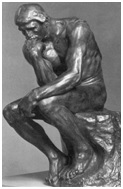|
 |
|
 |
|
|
||
Blaise Pascal - Philosophy, Ethics and Learning
Blaise Pascal (1623-62)
French mathematician (pictured right), physicist and philosopher. Inventor of the:
Important contributor to:
The SI unit of pressure is named after him.
His most famous book is... Pensées (Thoughts) , published in 1658.
What did he say about ethics and learning?
1. Think well Morality and happiness depend on good thinking and quiet reflection, because they help you make the right choices. People are sinfully weak, but the right thinking (e.g. to love others) makes them good and great. “Man is only a reed, the weakest to be found in nature; but he is a thinking reed”, he said. Since you can’t know everything, it is “necessary to know a little about everything”. 2. God is great After his religious conversion in 1654, Pascal realized the:
You must:
God is all powerful, “an infinite sphere whose centre is everywhere and circumference is nowhere”. 3. Pascal’s wager This wager emphasizes two possibilites:
So you should believe in God and Jesus (pictured right in Dirk Bouts' painting from c 1470-75) .
4. Love Follow the love in your heart, not the intellectual reasoning of your brain. “The heart has its reasons which reason knows nothing of”, he said. Don’t use religion as an excuse for doing evil.
5. Scientific method
For example, he proved the principles and value of the barometer by carrying one up and down a church tower. Therefore, science is constantly progressing through:
6. Single-minded hard work He devoted himself to work and didn’t marry. He was brilliant and a child prodigy, educated by his father, a judge. But he worked incredibly hard to make the most of his ability. An essay on mathematics, written when he was only 17, was envied by another great French mathematician and philosopher, René Descartes (pictured right below). 7. Self-discipline Have fun but control your desires. “It is shameful to succumb to pleasure”, he said.
8. Intuition This is very important in learning, because it gives you “flexibility of thought”. 9. Stand up for your principles
10. Love life and learning Passion for life comes from thinking clearly about the useful and worthwhile things you can do. A great mind “sees distinctly what it loves”, he said.
Key quotes on learning and wisdom Thought constitutes the greatness of man. Man is only a reed, the weakest to be found in nature; but he is a thinking reed.
Key quote on the learning organization You always admire what you really don’t understand.
Key quotes on ethics The heart has its reasons which reason knows nothing of. All our dignity consists in thought. Let us then strive to think well; that is the basic principle of morality It is shameful to succumb to pleasure.
Key quote on corporate culture People almost invariably arrive at their beliefs not on the basis of proof but on the basis of what they find attractive.
Key quote on influencing people Kind words do not cost much. Yet they accomplish much.
Key quote on communication I have made this [letter] longer than usual, only because I have not had the time to make it shorter.
Key quotes on religion Men never do evil so completely and cheerfully as when they do it from religious conviction. It is heart which experiences God, and not the reason. |
|
|
||
|
|
||
| Copyright © wisdomtowin.com 2025 All Rights Reserved | ||
|











